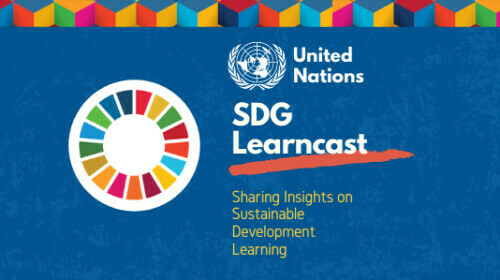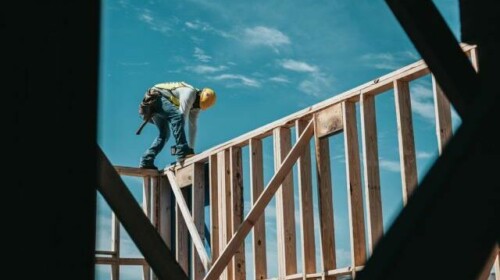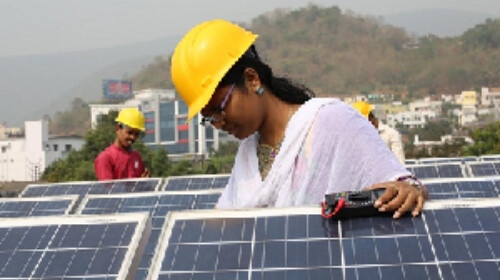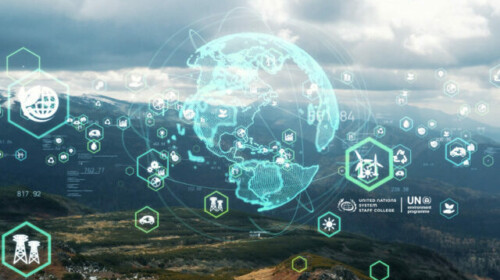Drawing from Earth Insight's reports "Congo in the Crosshairs: New Oil & Gas Expansion Threats to Forests and Communities" "Crisis Point: Oil and Gas Expansion Threats to Amazon and Congo Basin Tropical Forests and Communities" and an article from The Guardian, we discovered that Africa's oil and gas territories could quadruple, threatening to wipe out a third of the dense tropical forests and accelerating climate change. One thing is clear: polluting countries must step up to rapidly decarbonize their own economies.
Tyson doesn’t just highlight problems but also offers solutions. From the Fossil Fuel Non-Proliferation Treaty's efforts to halt fuel expansion to the push for banks to champion against fossil fuel projects, Tyson shines a light on pathways to counter these looming threats. Listen to the podcast to learn more about protecting our world's critical ecosystems.
Learn more: Fossil Fuel Threats to the Critical Ecosystems and Indigenous and Local Communities by Earth Insight.
Want to learn more about sustainable development and learning? Subscribe to SDG Learncast on podcast apps.
[What follows is a transcription of the podcast, modified for enhanced web readability.]
Paulyn Duman: Welcome to the SDG Learncast with me, Paulyn Duman. In every episode, I bring insightful conversations around the subject of sustainable development and learning, helping us all to achieve a sustainable future.
In this episode, we will look into the pressing threats faced by two of our planet's vital ecosystems: the Amazon Rainforest, often referred to as the "lungs of the Earth", and the Congo Basin, the ecological heart of Africa.
Recent reports from The Guardian and Earth Insight paint a concerning picture, indicating not only a potential boom in areas allocated for oil and gas extraction in Africa but also pinpointing the relentless expansion of oil industries in the Amazon and Congo Basin, compromising their lush forests and diverse communities. The stakes are high with millions of lives, both human and wildlife, hanging in the balance. Join us as we untangle the complex web of fossil fuel expansion and conservation efforts, underscoring the immediate need for global decarbonization and the preservation of both ecological and cultural treasures.
Our guest for this episode is Mr. Tyson Miller, the Executive Director of Earth Insight. He will share his thoughts on the need for 21st-century solutions that put people, nature and climate stability first. Tyson, welcome to the SDG Learncast!
Paulyn Duman: Why is the oil and gas expansion and the Congo Basin and the Amazon rainforest so critical right now?
Tyson Miller: Unfortunately, this particular moment is critical because of a variety of geopolitical dynamics and concerns in play. Obviously, with the war in Ukraine, there's less access to fossil fuels. There are also a range of pressures specifically on the African continent. Exploration blocks represent about four times the size of current production blocks, so, there's a potential for a massive increase in oil and gas expansion. In terms of where those blocks are located, about 90% of all tropical forest and primary forests on the continent are in the Congo Basin.
In the Congo Basin region, there are about 70 million hectares, an area about twice the size of Germany, that currently host oil and gas production blocks. What's in play in the Democratic Republic of the Congo (DRC), is illustrative of the broader threats in other countries. Recently, there are more than 30 oil and gas blocks that have been put up for action.
Hydrocarbon ministers and others are really trying to find companies that will come in and engage in oil and gas expansion in the world's second-largest rainforest — a critical region. There are massive amounts of biodiversity, with over 150 distinct ethnic groups calling the Congo Basin home. Thirty-two million people, or 20% of the populated places in the Congo Basin countries, are now in oil and gas blocks. Now is a really pivotal time, where there can be alternative development pathways that Congo Basin countries choose, as opposed to what we've seen historically.
Paulyn Duman: Three-quarters of the Congolese people are living on less than $2 a day. Despite the huge minerals and reserves and potential for renewables as you also mentioned. What's also important to highlight here is that they don't benefit from these operations. How does the economic disparity in the Congo impact the region's approach to oil and gas development?
Tyson Miller: There has been some really interesting mapping by a group called Resource Matters. They have conducted an analysis looking at what individuals and communities need in the region for true energy security, and it's not expanding oil and gas development in the DRC or other nations.
Most of that, if not all of that, oil would be exported to export markets. So, in terms of what's needed locally to address sustainability, Sustainable Development Goals and regional needs, I think economic activity that is grounded in the principles of bioeconomy.
There are ways in which communities can have expanded rights and expanded territories, as well as community-owned forests, to essentially ensure the integrity of the ecosystem and support local livelihoods that can enable the forest to stay intact and without big industry coming in, essentially exploiting the region for export markets.
If regional development is really the end goal, fossil fuel expansion isn't the path forward.
Paulyn Duman: Tyson, what do you mean by bioeconomy?
Tyson Miller: It's obviously different in different regions. There is a range of indigenous nationalities and federations that are developing life plans for how different types of economic activities can move forward without essentially fragmenting the forest or bringing large industrial activities.
So, in terms of solutions, there's a lot more needed for local organizations to define what types of economic activities they intend to pursue while maintaining the integrity and health of the ecosystem.
Paulyn Duman: There are also significant oil and gas expansion threats in the Amazon. Can you explain what's at stake in more detail?
Tyson Miller: I've been working on this issue for about five years or so. One thing that's really concerning, especially as someone who lives in the United States, is that the majority of the exports of oil out of the western Amazon—where most of the oil is exported—are destined for the United States.
About two-thirds of that oil goes to refineries in California. California has significant climate leadership goals and a reputation for environmental leadership. However, it is consuming a huge amount of oil from the Amazon. In fact, in California, where I'm originally from, about one in nine gallons on average pumped in-state comes from the Amazon.
Similar to the Congo Basin region, there's just a massive amount of undisturbed tropical forest or primary and priority forest, about 65 million hectares or an area twice the size of Poland. There's overlap with existing or planned oil and gas blocks. Just like in the Congo Basin region, there's a tremendous amount of indigenous and local communities and cultural diversity. There are over 500 distinct indigenous nationalities who call the Amazon Basin home.
Unfortunately, about 25 million hectares of indigenous territories are now in either production or exploration blocks. This is really highly problematic. In fact, about 12 million people are living in approximately 10,000 villages or towns. That's 20% of populated places in Amazonia within oil and gas blocks.
The Amazon Basin as a whole, on average, is in the midst of a tipping point crisis. The ecosystem needs to have 75% to 80% intactness in order to generate its own rainfall and avoid feedback loops that would force the transition of the ecosystem from a tropical rainforest to a tropical savanna.
Just like in the Congo, the first cut is the deepest. So, when big industries like oil and gas mining and other major industries such as agribusiness bring in their infrastructure, you have a gateway to deforestation. It's really concerning that these two forest basins, which are the most bio-culturally diverse regions on the planet, are facing a degree of oil expansion.
Paulyn Duman: You've painted a stark picture for these two regions, the Congo basin and the Amazon rain forest. Can you highlight other areas facing similar threats?
Tyson Miller: Before I get into that, I guess what really has struck me is that the International Energy Agency has stated that to stay within the Paris Agreement threshold of 1.5 degrees Celsius, no further fossil fuel expansion must take place. But if you look at current forecasts for 2030, government expansion plans would lead to about 240% more coal, 57% more oil, and 71% more gas than would be consistent with a 1.5-degree threshold. That's affecting whether it's the Amazon or the Congo Basin or other regions. That is what we have to get out in front of collectively—fossil fuel expansion. It's just not compatible with progress on any of the SDGs and with our need for climate stability.
You would think these would be happening in the world's two largest rainforest basins and the threat of oil and gas expansion is illustrative of what we're facing globally. One area in particular is the Coral Triangle region. This is the most biodiverse marine ecosystem on the planet. We just did a cursory analysis of the oil and gas expansion threat in the Coral Triangle and we found that there are over 300 oil and gas blocks for production and exploration that overlap or that are in the Coral Triangle region, and that about half of all the corals within the Coral Triangle are in these oil and gas blocks. We did a deeper dive into the "Banking on Climate Chaos" report of the LNG or the fossil gas build-out in the Batangas Province in the Philippines and the Verde Island passage and found that there are all sorts of concerns and what that might mean for increased shipping intensity.
There was a recent spill there. You're going to have the likelihood of increased spills, but also that increase in shipping intensity and all the coastal development of these facilities on the coastlines has the potential to vastly impact the corals, the mangroves, the seagrasses that are all vital for these rich marine ecosystems.
Paulyn Duman: It sounds grim, but where do you see hope? What are the 21st-century solutions that put people, nature and climate first? And can you elaborate on what the solutions might look like?
Tyson Miller: Yeah, we all need to be focused on having clear eyes and a clear sense of what the threats are so we can avoid going down certain pathways or be prepared to counter those threats. But having momentum and creative, disruptive, bold solutions, momentum for these solutions out in the world is absolutely vital.
I'll just mention that both the reports we produced "Congo and the Crosshairs," and "The Crisis Point," looked at oil and gas expansion threats to the Congo Basin region and the Amazon.
We profile a range of different solution frameworks that are out there as a core part of our analyses. I'm struck by a few solutions frameworks that are gaining momentum and steam in the world. One of those is the fossil fuel non-proliferation treaty. You can find more about that on the website, fossilfueltreaty.org. It's gaining steam, with island nations calling for other nations to commit to no fossil fuel expansion. That's a really bold, simple, clear solution.
At COP 15, there was the launch of the "Moratorium on Industrial Activity and Primary Forest." which is vital. We need to focus on areas that have already been impacted, sustainable intensification, and in exchange for or in addition to drawing lines in the sand or around the areas that are intact.
A lot of the oil and gas development goes back to the Western Amazon. In Ecuador specifically, but in a range of other nations, debt—paying back loans and debt—is driving a lot of the industrial expansion. I think widespread debt forgiveness in exchange for keeping oil and gas in the ground and expanding protected areas could be a really pivotal solution.
To the extent that banks and financial institutions are really out in front and saying, "Hey, we won't commit to any fossil fuel expansion." You've seen a number of those commitments, and they need to be strong and without loopholes.
When I was working on the campaign in the Amazon, there were ING and BNP Paribas, a couple of banks that made those commitments globally, but also for the Amazon region. If we look at history, especially like in Brazil when they were able to cut their deforestation rates pre-Bolsonaro by 80%, a lot of that was because developed nations were providing resources in the form of payments for ecosystem services that enabled some of the new policies and codes. A whole next generation of what payments for ecosystem services look like. It is really critical.
Honestly, carbon markets have been critiqued and criticized for good reason for quite a lot of time for not being as effective as they need to be. But I think that there's a lot of potential with respect to high-integrity carbon markets where you can leverage those dynamics and the interest and the desire of companies to offset their impacts and their emissions through carbon markets. Those can be done in the right way.
The UN Secretary-General Guterres' Acceleration Agenda needs to be unpacked and prioritized. Out of the range of the broad scope of what he and others are calling for, shifting subsidies is a massive, bold, and disruptive solution. Shifting subsidies from the fossil fuel sector to the renewable sector would enable a just energy transition. It would enable the tens of billions, if not trillions, that are going toward subsidizing the industry now to be leveraged for what's needed and what's next. Putting a price on carbon, an effective carbon tax, I think is a disincentive. It has been talked about, but really implementing that on a global scale is vital.
Paulyn Duman: Tyson, can we really achieve sustainable development without the oil and gas companies, without the oil and gas expansion? Can the world really move on without them? And if yes, how?
Tyson Miller: It's a critical question for our collective and shared future. There needs to be a transition, on-ramps or off-ramps, I should say. The short answer to the question is, can the world move forward without fossil fuel companies, or in what way can we hit the goals we need to hit with or without their engagement?
The short answer is yes, the world can move forward without fossil fuel companies having the power, the grip on decision-makers, and the policies that these companies have had. What's really critical and what's needed is a collective commitment to the managed decline and phase down; and reorientation of subsidies that are currently going to the fossil fuel sector. With these principles, certainly we can. If we can go to the moon, then we can reorient our priorities and our focus and be collectively aligned towards a path for our shared future.
Fossil fuel companies need to get out of the way and not subvert policies and try to leverage opportunities for every last drop. Honestly, I think that's what's critical and necessary. If we can finance massive wars and the like to the tune of trillions of dollars, we can finance the restoration economy. We can find the solution pathways. It's not easy to say, "Hey, let's transition all of these trillions in subsidies from a sector and an industry that's pushing us off a cliff." That won't be an easy endeavour, but it's absolutely critical. If we approach it in a way where we're getting the solutions, the resourcing that they need and we're clear about ending the fossil fuel expansion and countries and leaders committing to no new oil and gas licenses, and banks and financial institutions committing to not financing expansion, it's completely doable. We have to make the commitment and then we have to not just talk about it. Our actions have to be really clear and true.
Paulyn Duman: Tyson, thank you so much for being our guest for this SDG Learncast, and I hope to speak to you soon again.
Tyson Miller: Thank you so much for the opportunity and for your good work out there. And yeah, looking forward to future conversations.
Paulyn Duman: And that was Tyson Miller of Earth Insight. What did we learn from this episode?
First, there are serious threats to our vital ecosystems. The Amazon Rainforest and the Congo Basin, rich in biodiversity and cultural significance, are under grave threat primarily due to the aggressive expansion of the oil industry. An alarming projection suggests a potential quadrupling of areas in Africa targeted for oil and gas extraction, endangering the essence of the Congo Basin. Such expansions not only jeopardize the ecological sanctity of these regions but also pose socio-economic challenges for the 35 million inhabitants within.
Second, there is an urgent need for decarbonization strategies. As nations grapple with escalating energy demands amid global geopolitical shifts, it becomes imperative to adopt robust decarbonization strategies. We explored the nexus between fossil fuel interests and global conservation commitments, underscoring the need for international dialogues on conservation.
And lastly, Tyson highlighted potential solutions and reforms to counter these threats. Our guest shed light on potential solutions and reforms to counter these threats. Notably, the Fossil Fuel Non-Proliferation Treaty aims to halt fossil fuel expansion, while initiatives like the Moratorium on Industrial Activity in Primary Forests emphasize protecting primary forests. Financial reforms are also seen as a pivotal solution, with a push for banks to lead against fossil fuel expansion and for the redirection of subsidies towards restoration.
You can find more of the SDG Learncast on the UN SDG:Learn website. For now, I’m Paulyn Duman. Thanks for listening.
---
Tyson Miller is the Executive Director of Earth Insight. He has been developing environmental and civil society organizations and initiatives for nearly 25 years. He has focused on advancing large landscape conservation, restricting access to fossil energy financing, sustainability in the forest products industry, improving environmental coverage in the news, and expanding environmental education and literacy. Initiatives that he has played a central role in co-founding or catalyzing include: the Amazonia for Life 80% by 2025 Coalition, the Exit Amazon Oil and Gas Campaign, the Wetland Forests Initiative, Environmental Paper Network, Dream of Nation, and a range of others. Prior to joining Earth Insight, Tyson led the forest and Amazon programs at Stand.earth, overseeing research initiatives tracking supply chains and financial flows for oil and gas expansion in the Amazon and leveraging this research to secure agreements with global banks. He also served as program director of the Dogwood Alliance, and as principal of Seenova.org. He also commenced a number of fiscally sponsored projects (e.g., Green Press Initiative, Project for Improved Environmental Coverage, Dream of a Nation) through the auspices of Social and Environmental Entrepreneurs.
Paulyn Duman is the Knowledge Management, Communications, and Reporting Officer at the United Nations System Staff College (UNSSC) Knowledge Centre for Sustainable Development and is a coordinator for the Joint Secretariat of UN SDG:Learn, together with UNITAR.
The opinions expressed in the SDG Learncast podcasts are solely those of the authors. They do not reflect the opinions or views of UN SDG:Learn, its Joint Secretariat, and partners.







